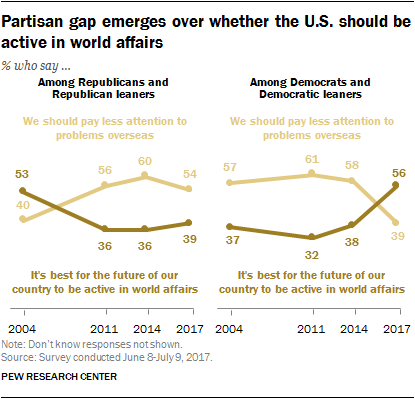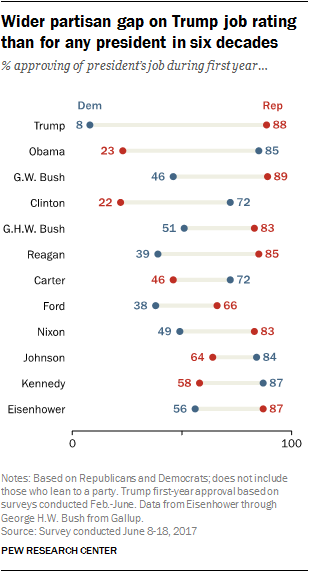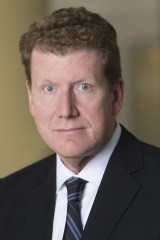For more than two decades, partisan polarization has been a powerful force in American politics. Today, the divide between Republicans and Democrats on fundamental values relating to the role of government, the environment, race, immigration and other issues dwarfs demographic, religious and education differences, according to surveys conducted by Pew Research Center in June and July.
What is striking is how little common ground there is among partisans today. Even on issues on which Republicans and Democrats have moved in the same direction – for example, growing numbers in both parties say homosexuality should be accepted rather than discouraged – the partisan differences are wider today than in the past.
Here are eight takeaways from the surveys:
Across 10 political values Pew Research Center has tracked since 1994, there is now an average 36-percentage-point gap between Republicans and Republican-leaning independents and Democrats and Democratic leaners. In 1994, it was only 15 points. The partisan gap is much larger than the differences between the opinions of blacks and whites, men and women and other groups in society.

Democrats have moved left on several issues. Over the past few years, some of the biggest changes in opinions among Democrats and Democratic-leaning independents have been on race and the role of government. There has been far less change in the views of Republicans and Republican leaners. As a result, the public’s views as a whole have moved in a more liberal direction.
In the new study (conducted before violent demonstrations in Charlottesville, Virginia, and recent protests by NFL players), 41% of Americans say racial discrimination is the main reason blacks can’t get ahead – up from 18% in 2009 and the highest level dating back to 1994. Virtually all of the change has come among Democrats, with a record 64% saying racial discrimination is the main barrier to blacks getting ahead. Among Republicans and Republican leaners, there has been less change since 2009 (9% then, 14% today).
The partisan gap also is widening over how much the government should do to help the needy. Half of Americans now say the government should do more to help the needy even if it means going deeper into debt, while 43% say the government can’t afford it. This shift toward more support for the needy is being driven by the 71% of Democrats who now hold this view, a dramatic increase since 2011. Only about a quarter (24%) of Republicans agree, a share little changed over the past several years.

Democrats are more likely than Republicans to favor an active global role for the U.S. As recently as three years ago, Republicans and Democrats were equally skeptical about the U.S. taking an active role in world affairs. But today, a majority of Democrats (56%) say it’s best for the country’s future to be active globally, up from 38% in 2014.
Republicans’ views have changed little over this period: In the new surveys, 39% of Republicans say it’s best for the U.S. to be active in world affairs, while 54% say we should pay less attention to overseas problems.
Republicans are divided over issues of economic fairness. Republicans with family incomes below $30,000 are more likely than those with incomes of $75,000 or more to regard economic inequality as a “very big problem.” By contrast, majorities of Democrats across income categories view economic inequality as a very big problem.
Among Republicans overall, slightly more say the U.S. economic system is generally fair to most Americans (50%) than say it unfairly favors powerful interests (46%). A large majority of Democrats (82%) say the economic system unfairly benefits powerful interests.
Democrats are split on whether hard work leads to success. Only about half of Democrats (49%) say most people can get ahead if they’re willing to work hard, compared with 77% of Republicans. Among Democrats, whites are more skeptical than either blacks or Hispanics that hard work leads to success. And while 57% of Democrats with at least a four-year degree say hard work is no guarantee of success for most people, fewer Democrats (45%) with less education say this.
Support for societal acceptance of homosexuality is at a record high. Seven-in-ten Americans now say homosexuality should be accepted rather than discouraged, up 9 percentage points in the past year and the highest share favoring acceptance of homosexuality dating back more than two decades. And for the first time ever, majorities of both Democrats (83%) and Republicans (54%) say homosexuality should be accepted.

Trump’s job ratings are more polarized than past presidents’. Based on surveys conducted this year (in February, April and June), Donald Trump’s job approval ratings are the most polarized of any first-year president dating back to Dwight D. Eisenhower in 1953.
Nearly nine-in-ten Republicans (88%) approved of Trump’s job performance, compared with just 8% of Democrats.
However, even before Trump took office, there had been a downward trend in presidential approval ratings among members of the party not in control of the White House. George W. Bush was an exception to this trend (46% average job rating among Democrats in his first year), largely because of his extraordinarily high level of support after the 9/11 attacks.
Correction: The section of this post on President Trump’s approval ratings and the chart “Wider partisan gap on Trump job rating than for any president in six decades” have been updated to exclude independents who lean Democratic or Republican. The numbers have not changed.
